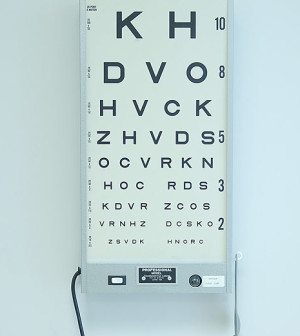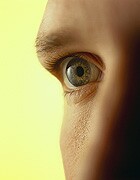- Double Mastectomy May Offer No Survival Benefit to Women With Breast Cancer
- Toxic Lead Found in Cinnamon Product, FDA Says
- Certain Abbott Blood Sugar Monitors May Give Incorrect Readings
- Athletes Can Expect High Ozone, Pollen Counts for Paris Olympics
- Fake Oxycontin Pills Widespread and Potentially Deadly: Report
- Shingles Vaccine Could Lower Dementia Risk
- Your Odds for Accidental Gun Death Rise Greatly in Certain States
- Kids From Poorer Families Less Likely to Survive Cancer
- Tough Workouts Won’t Trigger Cardiac Arrest in Folks With Long QT Syndrome
- At-Home Colon Cancer Test Can Save Lives
Persuasive Power of Eye Contact May Be a Myth, Study Suggests


THURSDAY, Oct. 3A new study challenges the common belief that making eye contact when trying to bring someone around to your point of view can help your cause.
Eye contact in such situations may actually make people more resistant to persuasion, especially if they already disagree with your stance, according to the findings released online Sept. 25 in advance of print publication in the journal Psychological Science.
“There is a lot of cultural lore about the power of eye contact as an influence tool,” study author Frances Chen, a professor at the University of British Columbia in Canada, said in a university news release. “But our findings show that direct eye contact makes skeptical listeners less likely to change their minds, not more, as previously believed.”
Chen and colleagues used eye-tracking technology to assess the effects of eye contact in a series of experiments involving people trying to get others to adopt their point of view.
The more that people watched a speaker’s eyes, the less persuaded they were by that person’s arguments. A greater amount of eye contact was only associated with greater receptiveness when people already agreed with the speaker on an issue, the investigators found.
The researchers also noted that people were more likely to find speakers convincing if they focused on the mouth rather than the eyes.
The findings indicated that eye contact can signal different kinds of messages depending on the situation. The study authors pointed out that while eye contact may be a sign of connection or trust in friendly situations between people, it is an important part of competitive or hostile encounters among primates and other mammals.
“Whether you’re a politician or a parent, it might be helpful to remember that trying to maintain eye contact may backfire if you’re trying to convince someone who has a different set of beliefs than you,” study co-author Julia Minson, of Harvard University’s Kennedy School of Government, said in the news release.
More information
HelpGuide.org offers tips on effective communication.
Source: HealthDay
Copyright © 2024 HealthDay. All rights reserved.










